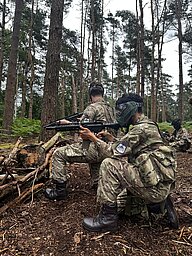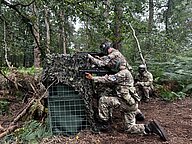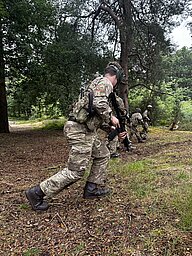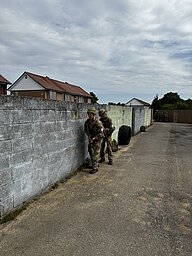CCF Army Summer Camp
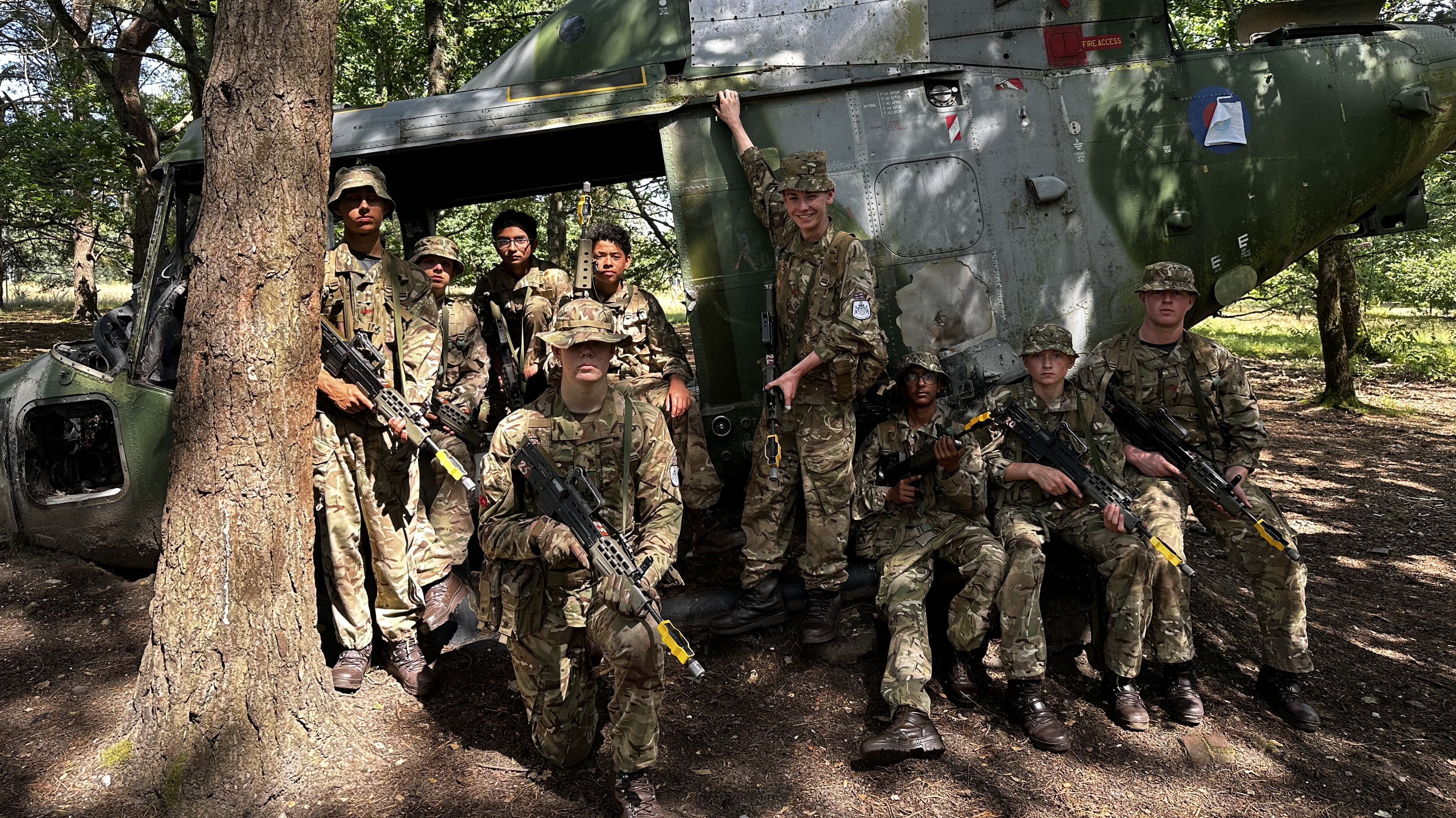
The end of this year marked Dan's first full year in the CCF, commemorating a year of countless hours of drill, fieldcraft, shooting and many more exercises. This effort all driven towards the final challenge we would face: Summer Camp.
writes Dan Z. (5ths)
Summer Camp would see the combined efforts of nine of our finest cadets - a surprisingly low number this year - led by the newly appointed cadet RSM Taylor, all working towards one common goal: be the very best contingent.
The camp was held on Longmoor Training Facility, notably the same facility used to train Ukrainian Troops for the ongoing conflict in Eastern Europe. It was an enriching week of training and Army based activities, mainly organised by London District Cadet Training Team, although many of the exercises were organised and led by NCOs from the notable Gurkha Brigade. The first day of camp was more of a settling in period, where we organised ourselves in our barracks, which we would share with London Oratory School (LOS).
Day 2 started with navigational training, where to our great surprised there were little to no navigational errors made by any of us. After that, we proceeded to the section that I personally enjoyed the most: Jungle Survival. Led by Sergeant Rai of 2 RGR we learned how to build a shelter, how to gather and process food and how to set traps for animals. We even got chances to test our knowledge and construct our own shelters and traps!
Day 3 was no less exciting. Our courage and endurance was thoroughly tested on the obstacle course managed by none other than our own Sergeant Anderson. The course had intricate bars to swing over, massive walls to scale, pits to cross, yet another set of even taller walls and a high beam balance challenge. After a thorough and hearty lunch and a short discussion with the Royal Engineers recruitment team, we moved onto our next activity - laser clay pigeon shooting. Here we had to try to apply our marksmanship principles in a completely foreign way.
I was most excited for the following two days, which were dedicated to fieldcraft. In full kit, with rifles, rations and blank ammunition, we took notes on lessons on how to construct a secure harbour, did noisy and quiet rehearsals and then did full a full run though. Next up were ambushes, led by an intimidating, Sergeant Gurung of the Queen Gurkha Engineers. We first discussed the theory behind what makes an ambush particularly effective and how to conduct different types of ambushes. In a stroke of good luck, I was in the killing group, which at a glance might seem daunting, however, it just meant that during the active ambush, our group would lay down the majority of effective fire, which was great fun with blank ammunition. We also practiced breaking from contact in small groups alongside section moving. The most memorable part of it all was undoubtedly fighting in built up areas, (FIBUA). After covering the theory aspects, we went over the different types of positioning as well as stoppage drills. We then broke into pairs. I was with RSM Taylor, and was fortunate enough to be able to practice and rehearse in a mock room area. Due to our thorough preparation, we gracefully cleared the final exercise and feel we got the absolute maximum out of our experience and supports.
The final day was a full-blown competition between contingents, with us and London Oratory School being counted as one, and with our strong bond after a week of being together, we felt just as strong as any other contingent. The day had leadership exercises, a drill competition, memory challenges, military knowledge, blind obedience and notably DCCT shooting. I got quite the scare on the DCCT as my rifle system was somehow faulty. Luckily, they managed to somewhat fix it, but my score was eventually disregarded from the competition because they found the system to still be faulty afterwards which would've had a negative impact on the overall performances. I must give congratulations to Cdt. Whiting who received an award for the second best shot of the camp by a margin of 2mm, which was truly a great effort. Amazingly our contingent also won the drill competition, evidencing the hard work.
On the final parade the result of the massive competition was revealed. We came third out of six contingents, and we lost out of the top place by only 31 point. All in all, it was truly a great experience with my friends. We learnt countless valuable skills and had our first exposure to survival training, which was wonderful. In the end, on the behalf of all the cadets who went on this trip, I extend our gratitude towards not only the staff from London Dist. CTT but especially to our own staff Sergeant Anderson, Sergeant (at that time) Konovalchik and Lieutenant Scott, all of which organised, managed and accompanied us along the camp and ensured it was the best experience we could've had.
As a final note I wish to issue a word of advice to any cadets new to the CCF or just starting to find their bearing inside of it. The CCF is not something that you do once a week, put in minimal effort into whilst expecting to get maximum output. You will only get out of it as much as you yourself put in, notably in effort and attendance. So, I encourage all new joiners to make use of these trips and the support given to you. Put simply, don't be afraid to reach outside of you comfort zone - “Don’t worry about failures, worry about the chances you miss when you don’t even try.” - Jack Canfield.
Other News